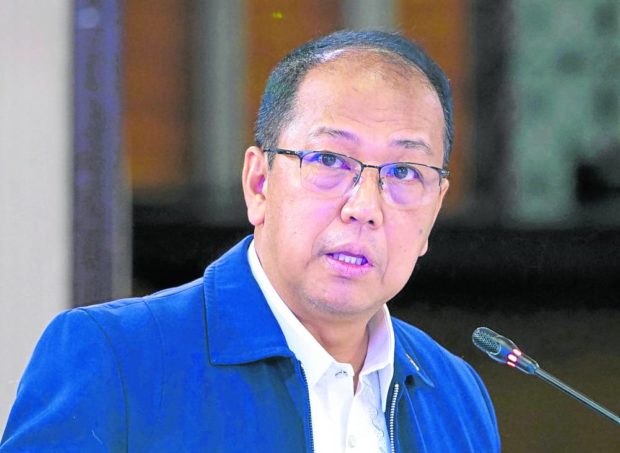
Secretary Carlito Galvez Jr. INQUIRER FILE PHOTO
MANILA, Philippines — The government will be unable to vaccinate 90 million individuals before President Duterte steps down, so it is lowering this target to 77 million-80 million by the end of June, according to Secretary Carlito Galvez Jr., the head of the national vaccination program.
Galvez said on Thursday that the country’s vaccination rate slowed down this year, dropping from 18.2 million doses administered in January, to 8.7 million in February and 6.7 million in March.
The reported 2.5 million doses administered so far this month was the latest “drawback,” Galvez said during an online “Kapihan” forum.
“We cannot anymore accomplish … the 90 million, considering that there was a remarkable drop in [the country’s vaccine] uptake during the previous month,” said Galvez, who is also the chief implementer of the National Task Force Against COVID-19.
“What we are pushing … we have to push our limits and [achieve] at least 77 million or 80 million by the end of the term of the President,” Galvez added.
The President leaves Malacañang on June 30.
‘Enemy is still there’
Asked to explain the slowdown in the vaccination drive, Galvez indicated that the motivation to get vaccinated had died down due to the “perception” that the severity of COVID-19 cases had been reduced because the reported cases of critical and severe infections remained low.
“Our challenge now is to change the mindset of people that our enemy, which is COVID, is still here,” he said. “We still can’t be complacent because, as WHO (World Health Organization) said, there is still a possibility of a surge before the end of the elections.”
WHO officials have warned Filipinos of a possible surge in COVID-19 cases in the next two months due to “unsafe” gatherings and events.
Campaign rallies for the national and local elections on May 9 have drawn the biggest crowds since the pandemic struck the country in early 2020.
In January, Galvez set the target of 90 million inoculated Filipinos before Mr. Duterte leaves office. At the start of the vaccination campaign, the government aimed to jab 70 million out of the country’s 110 million population to achieve so-called herd immunity.
As of April 19, 67.1 million individuals have been fully vaccinated. Only 12.7 million got their booster shot out of some 50 million who are due for their booster this month.
Hard to reach
On Tuesday, Health Undersecretary Myrna Cabotaje, who is the head of the National Vaccination Operations Center, also said that it would be difficult to vaccinate all the 90 million targeted because some of the people who were still not vaccinated were either “hard to reach” or refuse to get jabbed.
In a bid to widen coverage, the government has set special vaccination days in the Bangsamoro Autonomous Region in Muslim Mindanao (BARMM) and Soccsksargen (South Cotabato, Cotabato, Sultan Kudarat, Sarangani and General Santos City), two regions that continue to lag behind in inoculation.
Galvez said that the three major challenges in raising the vaccination coverage in the BARMM was “negative perception” due to disinformation, traditional beliefs and organizational difficulties.
Only 27.4 percent and 58.8 percent of the target population have been fully vaccinated in the BARMM and Soccsksargen, respectively, based on the latest government data.
Aiming to boost immunity against COVID-19 even further, Dr. Nina Gloriani, the chair of the government’s Vaccine Expert Panel (VEP) on Thursday suggested administering three primary doses of “low efficacy” vaccines.
3 doses, then booster
She said that according to the WHO, there were “certain selected vaccines” that have relatively low efficacy against SARS-CoV-2, the virus that causes COVID-19.
Gloriani did not specify which vaccines the WHO referred to.
“I would prefer three primary doses then a booster dose for those vaccines that have relatively low efficacy based on data,” she said, stressing that this was just her own opinion.
Gloriani said the rollout of the second booster shot for eligible groups would be available and ready for approval by Heath Secretary Francisco Duque as soon as it is recommended by the Health Technology Assessment Council (HTAC).
“Actually, we prefer heterologous booster, because we know based on data, the protection given when it is heterologous is better,” she said.
A heterologous booster shot involves the administration of a vaccine brand that is different from the primary vaccine that was administered.
Gloriani said the government was still studying whether it was now time to give a second booster shot to healthy individuals.
The administration of the second booster for health-care workers, senior citizens and those immunocompromised was originally scheduled for April 20 but it was delayed. The Department of Health on Monday said it was waiting for the HTAC’s recommendation to give the second booster. It added that this second shot would be administered four months after the first booster dose.
RELATED STORY:
44 million Filipinos still unboosted after gov’t missed vaccination target